Heute kam schon wieder Post aus Asien! Nach dem billigen „fenvi“ und dem Fake Alfa-Adapter werde ich heute deshalb folgenden Wifi-Adapter testen:
EDUP EP-AC1605 Dual Band 1200Mbps 2.4GHz/ 5.8GHz Wi-Fi dongle USB 3.0 WiFi Adapter
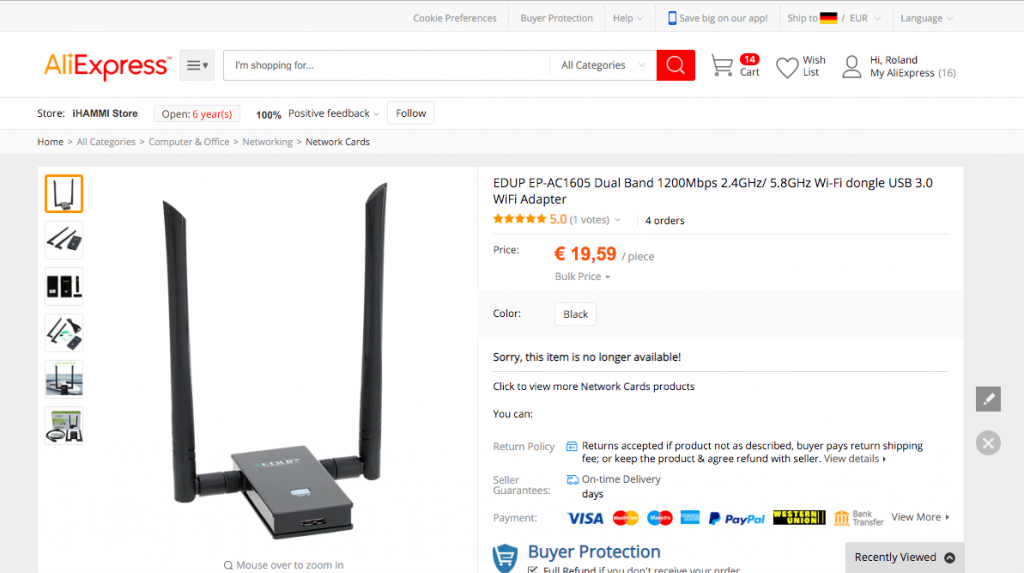
Wie die beiden vorherigen Wifi-Adapter habe ich auch diesen am 22. Januar 2019 bestellt, dieser hier brauchte also am längsten. Ich bezahlte 19,64€ und bekam folgendes:
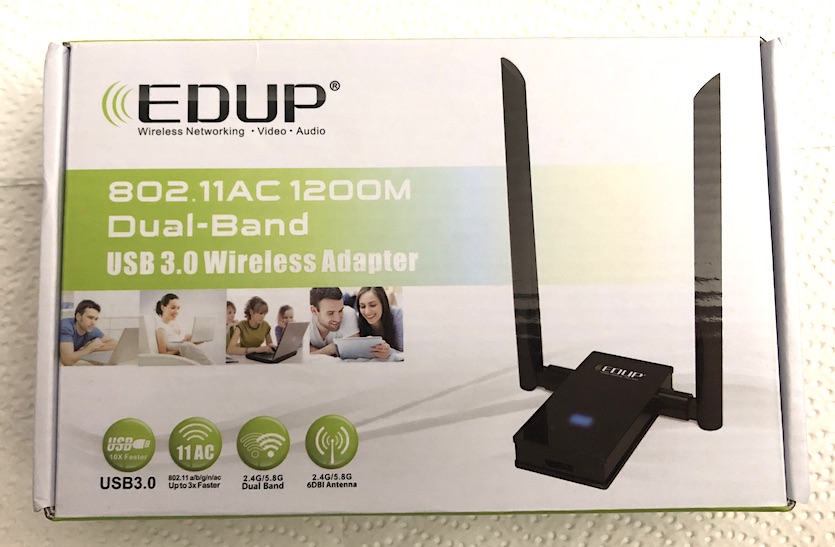
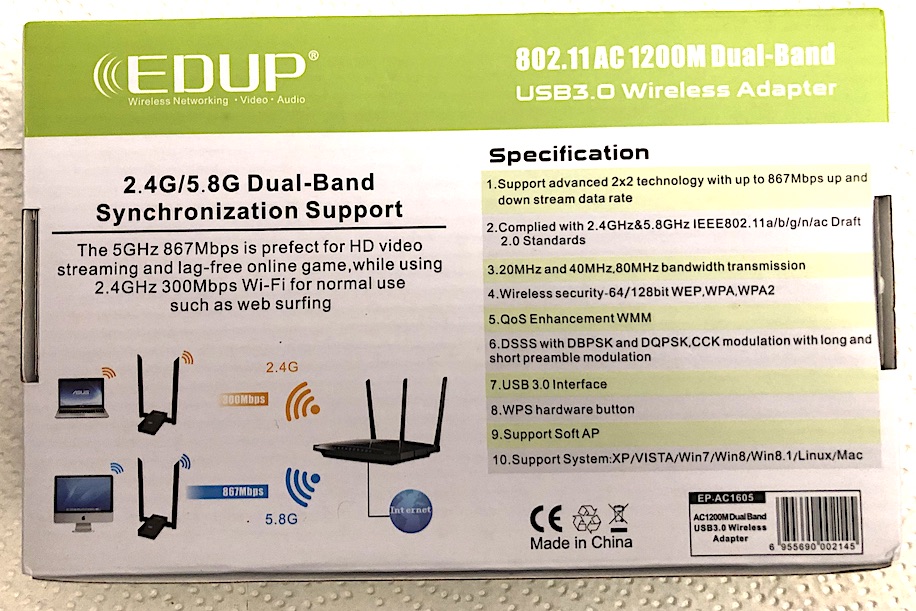
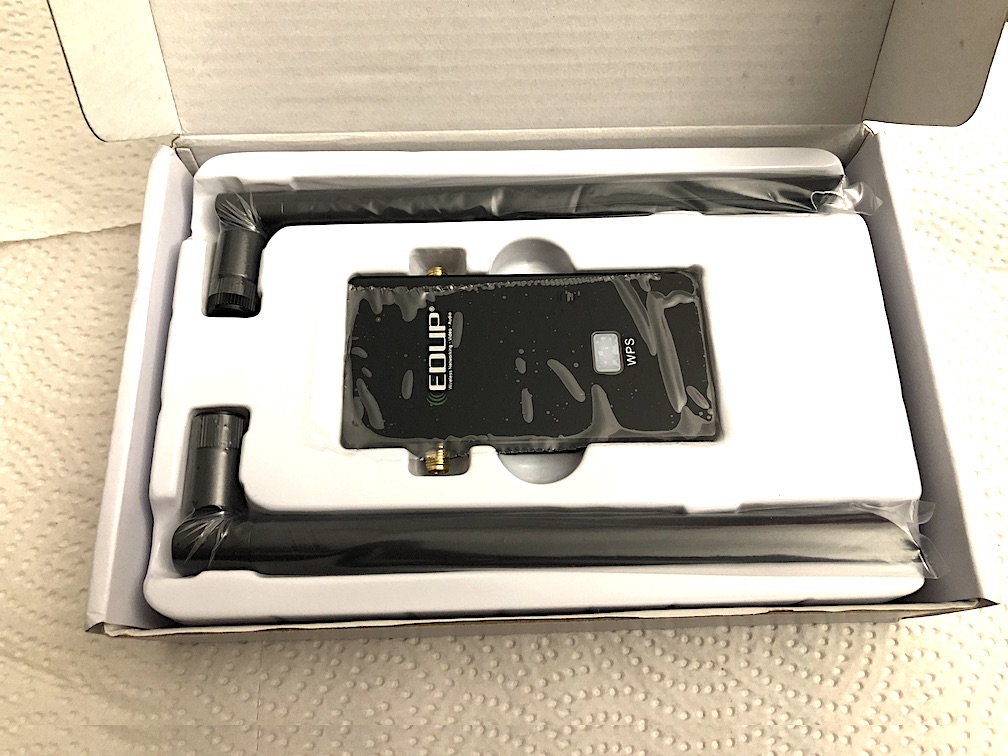
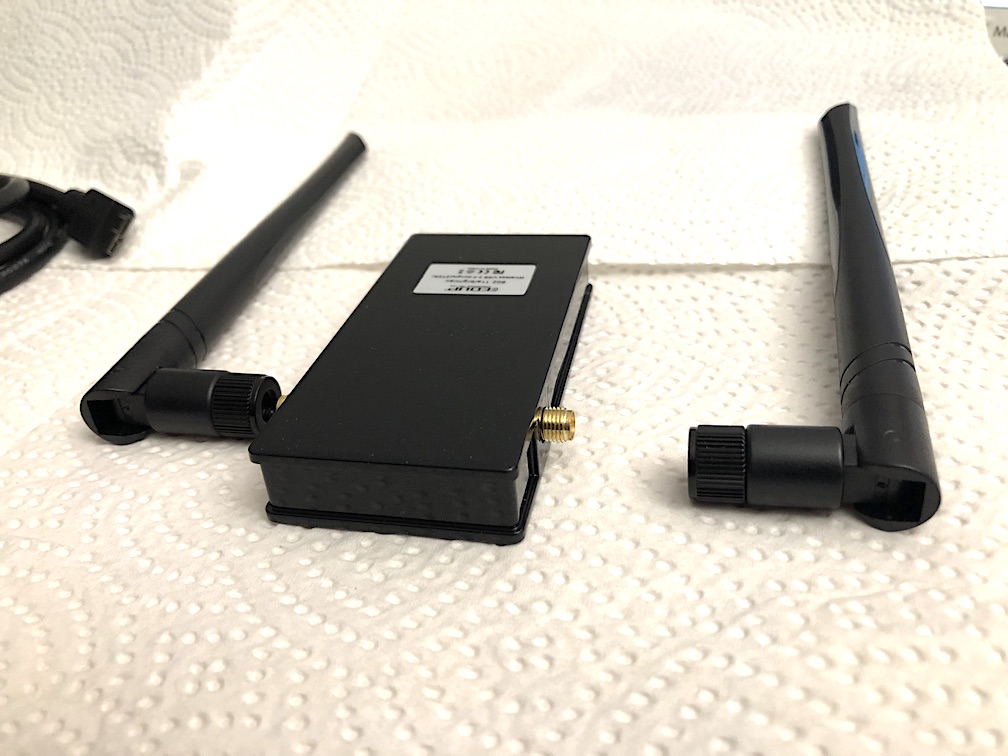
Unter der Haube werkelt hier ein neuerer RALink-Chipsatz, der nach der Übernahme nun Mediatek heisst und deutlich problematischer in der Nutzung ist. So hat erst Linux 4.19 Mainline die dafür nötigen Treiber dabei. Dazu muss man sich auch noch die passende Firmeware runterladen.
So bin ich vorgegangen (Testsystem eine Ubuntu 18.04.1 Server VM in VMWare mit USB 3 support aktiviert) – Bei Kali/Debian dürfte es ähnlich sein (4.19 ist in unstable/sid):
- 4.19er Packages von https://kernel.ubuntu.com/~kernel-ppa/mainline/v4.19/ besorgt:
linux-headers-4.19.0-041900_4.19.0-041900.201810221809_all.deb
linux-headers-4.19.0-041900-generic_4.19.0-041900.201810221809_amd64.deb
linux-image-unsigned-4.19.0-041900-generic_4.19.0-041900.201810221809_amd64.deb
linux-modules-4.19.0-041900-generic_4.19.0-041900.201810221809_amd64.deb
2. Firmware Blobs:
git clone https://git.kernel.org/pub/scm/linux/kernel/git/firmware/linux-firmware.git
cp -R linux-firmware/mediatek /lib/firmware
3. Reboot
4. Einstecken:
# dmsg
usb 4-1: new SuperSpeed Gen 1 USB device number 2 using xhci_hcd
usb 4-1: New USB device found, idVendor=0e8d, idProduct=7612, bcdDevice= 1.00
usb 4-1: New USB device strings: Mfr=1, Product=2, SerialNumber=3
usb 4-1: Product: 802.11ac WLAN
usb 4-1: Manufacturer: MediaTek Inc.
usb 4-1: SerialNumber: 000000000
usb 4-1: reset SuperSpeed Gen 1 USB device number 2 using xhci_hcd
mt76x2u 4-1:1.0: ASIC revision: 76120044
mt76x2u 4-1:1.0: ROM patch build: 20140408060640a
mt76x2u 4-1:1.0: Firmware Version: 0.0.00
mt76x2u 4-1:1.0: Build: 1
mt76x2u 4-1:1.0: Build Time: 201406241830____
ieee80211 phy1: Selected rate control algorithm 'minstrel_ht'
mt76x2u 4-1:1.0 wlxexxxxxxx: renamed from wlan0
IPv6: ADDRCONF(NETDEV_UP): wlxexxxxxxx: link is not ready
# lsusb
Bus 004 Device 003: ID 0e8d:7612 MediaTek Inc.
# iw phy
Wiphy phy1
max # scan SSIDs: 4
max scan IEs length: 2243 bytes
max # sched scan SSIDs: 0
max # match sets: 0
max # scan plans: 1
max scan plan interval: -1
max scan plan iterations: 0
Retry short limit: 7
Retry long limit: 4
Coverage class: 0 (up to 0m)
Device supports RSN-IBSS.
Supported Ciphers:
* WEP40 (00-0f-ac:1)
* WEP104 (00-0f-ac:5)
* TKIP (00-0f-ac:2)
* CCMP-128 (00-0f-ac:4)
* CCMP-256 (00-0f-ac:10)
* GCMP-128 (00-0f-ac:8)
* GCMP-256 (00-0f-ac:9)
* CMAC (00-0f-ac:6)
* CMAC-256 (00-0f-ac:13)
* GMAC-128 (00-0f-ac:11)
* GMAC-256 (00-0f-ac:12)
Available Antennas: TX 0x3 RX 0x3
Supported interface modes:
* managed
* monitor
Band 1:
Capabilities: 0x1ff
RX LDPC
HT20/HT40
SM Power Save disabled
RX Greenfield
RX HT20 SGI
RX HT40 SGI
TX STBC
RX STBC 1-stream
Max AMSDU length: 3839 bytes
No DSSS/CCK HT40
Maximum RX AMPDU length 65535 bytes (exponent: 0x003)
Minimum RX AMPDU time spacing: 4 usec (0x05)
HT TX/RX MCS rate indexes supported: 0-15
Bitrates (non-HT):
* 1.0 Mbps (short preamble supported)
* 2.0 Mbps (short preamble supported)
* 5.5 Mbps (short preamble supported)
* 11.0 Mbps (short preamble supported)
* 6.0 Mbps
* 9.0 Mbps
* 12.0 Mbps
* 18.0 Mbps
* 24.0 Mbps
* 36.0 Mbps
* 48.0 Mbps
* 54.0 Mbps
Frequencies:
* 2412 MHz [1] (20.0 dBm)
* 2417 MHz [2] (20.0 dBm)
* 2422 MHz [3] (20.0 dBm)
* 2427 MHz [4] (20.0 dBm)
* 2432 MHz [5] (20.0 dBm)
* 2437 MHz [6] (20.0 dBm)
* 2442 MHz [7] (20.0 dBm)
* 2447 MHz [8] (20.0 dBm)
* 2452 MHz [9] (20.0 dBm)
* 2457 MHz [10] (20.0 dBm)
* 2462 MHz [11] (21.0 dBm)
* 2467 MHz [12] (21.0 dBm) (no IR)
* 2472 MHz [13] (21.0 dBm) (no IR)
* 2484 MHz [14] (21.0 dBm) (no IR)
Band 2:
Capabilities: 0x1ff
RX LDPC
HT20/HT40
SM Power Save disabled
RX Greenfield
RX HT20 SGI
RX HT40 SGI
TX STBC
RX STBC 1-stream
Max AMSDU length: 3839 bytes
No DSSS/CCK HT40
Maximum RX AMPDU length 65535 bytes (exponent: 0x003)
Minimum RX AMPDU time spacing: 4 usec (0x05)
HT TX/RX MCS rate indexes supported: 0-15
VHT Capabilities (0x018001b0):
Max MPDU length: 3895
Supported Channel Width: neither 160 nor 80+80
RX LDPC
short GI (80 MHz)
TX STBC
VHT RX MCS set:
1 streams: MCS 0-9
2 streams: MCS 0-9
3 streams: not supported
4 streams: not supported
5 streams: not supported
6 streams: not supported
7 streams: not supported
8 streams: not supported
VHT RX highest supported: 0 Mbps
VHT TX MCS set:
1 streams: MCS 0-9
2 streams: MCS 0-9
3 streams: not supported
4 streams: not supported
5 streams: not supported
6 streams: not supported
7 streams: not supported
8 streams: not supported
VHT TX highest supported: 0 Mbps
Bitrates (non-HT):
* 6.0 Mbps
* 9.0 Mbps
* 12.0 Mbps
* 18.0 Mbps
* 24.0 Mbps
* 36.0 Mbps
* 48.0 Mbps
* 54.0 Mbps
Frequencies:
* 5180 MHz [36] (19.0 dBm) (no IR)
* 5200 MHz [40] (19.0 dBm) (no IR)
* 5220 MHz [44] (19.0 dBm) (no IR)
* 5240 MHz [48] (19.0 dBm) (no IR)
* 5260 MHz [52] (19.0 dBm) (no IR, radar detection)
* 5280 MHz [56] (19.0 dBm) (no IR, radar detection)
* 5300 MHz [60] (19.0 dBm) (no IR, radar detection)
* 5320 MHz [64] (19.0 dBm) (no IR, radar detection)
* 5500 MHz [100] (19.0 dBm) (no IR, radar detection)
* 5520 MHz [104] (19.0 dBm) (no IR, radar detection)
* 5540 MHz [108] (19.0 dBm) (no IR, radar detection)
* 5560 MHz [112] (19.0 dBm) (no IR, radar detection)
* 5580 MHz [116] (19.0 dBm) (no IR, radar detection)
* 5600 MHz [120] (19.0 dBm) (no IR, radar detection)
* 5620 MHz [124] (19.0 dBm) (no IR, radar detection)
* 5640 MHz [128] (19.0 dBm) (no IR, radar detection)
* 5660 MHz [132] (19.0 dBm) (no IR, radar detection)
* 5680 MHz [136] (19.0 dBm) (no IR, radar detection)
* 5700 MHz [140] (19.0 dBm) (no IR, radar detection)
* 5745 MHz [149] (19.0 dBm) (no IR)
* 5765 MHz [153] (19.0 dBm) (no IR)
* 5785 MHz [157] (19.0 dBm) (no IR)
* 5805 MHz [161] (19.0 dBm) (no IR)
* 5825 MHz [165] (19.0 dBm) (no IR)
Supported commands:
* new_interface
* set_interface
* new_key
* start_ap
* new_station
* new_mpath
* set_mesh_config
* set_bss
* authenticate
* associate
* deauthenticate
* disassociate
* join_ibss
* join_mesh
* set_tx_bitrate_mask
* frame
* frame_wait_cancel
* set_wiphy_netns
* set_channel
* set_wds_peer
* probe_client
* set_noack_map
* register_beacons
* start_p2p_device
* set_mcast_rate
* connect
* disconnect
* set_qos_map
* set_multicast_to_unicast
Supported TX frame types:
* IBSS: 0x00 0x10 0x20 0x30 0x40 0x50 0x60 0x70 0x80 0x90 0xa0 0xb0 0xc0 0xd0 0xe0 0xf0
* managed: 0x00 0x10 0x20 0x30 0x40 0x50 0x60 0x70 0x80 0x90 0xa0 0xb0 0xc0 0xd0 0xe0 0xf0
* AP: 0x00 0x10 0x20 0x30 0x40 0x50 0x60 0x70 0x80 0x90 0xa0 0xb0 0xc0 0xd0 0xe0 0xf0
* AP/VLAN: 0x00 0x10 0x20 0x30 0x40 0x50 0x60 0x70 0x80 0x90 0xa0 0xb0 0xc0 0xd0 0xe0 0xf0
* mesh point: 0x00 0x10 0x20 0x30 0x40 0x50 0x60 0x70 0x80 0x90 0xa0 0xb0 0xc0 0xd0 0xe0 0xf0
* P2P-client: 0x00 0x10 0x20 0x30 0x40 0x50 0x60 0x70 0x80 0x90 0xa0 0xb0 0xc0 0xd0 0xe0 0xf0
* P2P-GO: 0x00 0x10 0x20 0x30 0x40 0x50 0x60 0x70 0x80 0x90 0xa0 0xb0 0xc0 0xd0 0xe0 0xf0
* P2P-device: 0x00 0x10 0x20 0x30 0x40 0x50 0x60 0x70 0x80 0x90 0xa0 0xb0 0xc0 0xd0 0xe0 0xf0
Supported RX frame types:
* IBSS: 0x40 0xb0 0xc0 0xd0
* managed: 0x40 0xd0
* AP: 0x00 0x20 0x40 0xa0 0xb0 0xc0 0xd0
* AP/VLAN: 0x00 0x20 0x40 0xa0 0xb0 0xc0 0xd0
* mesh point: 0xb0 0xc0 0xd0
* P2P-client: 0x40 0xd0
* P2P-GO: 0x00 0x20 0x40 0xa0 0xb0 0xc0 0xd0
* P2P-device: 0x40 0xd0
software interface modes (can always be added):
* monitor
interface combinations are not supported
HT Capability overrides:
* MCS: ff ff ff ff ff ff ff ff ff ff
* maximum A-MSDU length
* supported channel width
* short GI for 40 MHz
* max A-MPDU length exponent
* min MPDU start spacing
Device supports TX status socket option.
Device supports HT-IBSS.
Device supports SAE with AUTHENTICATE command
Device supports low priority scan.
Device supports scan flush.
Device supports AP scan.
Device supports per-vif TX power setting
Driver supports full state transitions for AP/GO clients
Driver supports a userspace MPM
Device supports active monitor (which will ACK incoming frames)
Device supports configuring vdev MAC-addr on create.
Kismet_server flutet leider relativ viele „ERROR: pcap radiotap converter got corrupted Radiotap header length“ allerdings findet es nach ein paar Minuten auch zwischen 50 und 70 Netze, darunter das vermutlich am oberen Ende der Sendelimite operierende Gäste-WiFI-Netz des 70m entfernten Asia-Restaurants.
Obwohl es vermutlich der chiptechnisch leistungsstärkste Adapter der 3 von AliExpress ist, gefällt er mir am wenigsten: Linux-Support ist ein Gefrickel und es hat Jahre dafür gebraucht, der USB3(!)-Micro-Anschluss nervt, das mitgelieferte Kabel ist sehr störrisch, unhandlich. Die Empfangsleistung passt irgendwie nicht zu den großen Antennen und dem „modernen“ Chipsatz.
Achtung! Laut Herstellerseite verbauen die unterschiedliche Chips je nach Version.